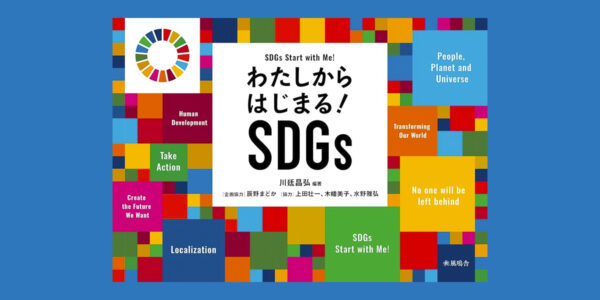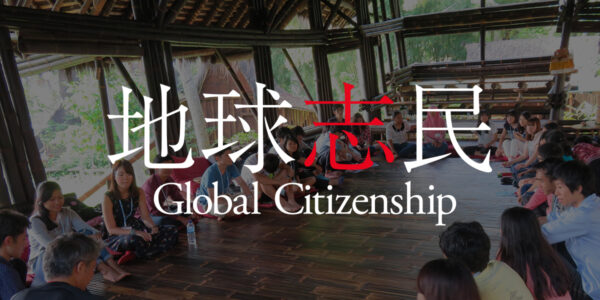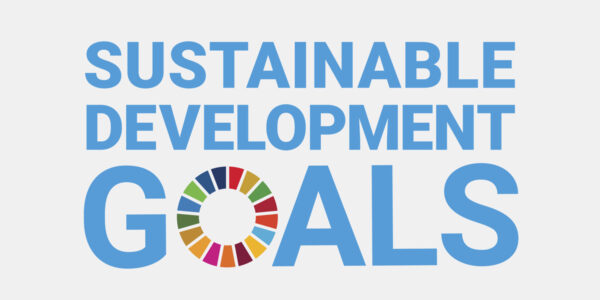- ホーム
- 非公開: GiFTについてAb...
- グローバル・シチズンシップ教育...
グローバル・シチズンシップ教育 参考文献
Global Citizenship Education Key Resources
※2017年6月に開催されたユネスコ・バンコク事務所主催『グローバル・シチズンシップ教育(GCED)会合』にて提供いただいた資料を許可を得て掲載しています。
-
A Human Rights Education Pack
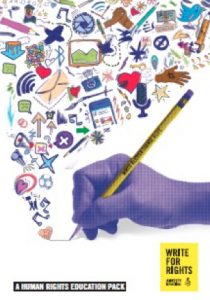 Amnesty International, 2015 This education pack contains five activities on human rights for young people to open their minds to global concerns, involving them in actions to have a real impact on people’s lives.
Amnesty International, 2015 This education pack contains five activities on human rights for young people to open their minds to global concerns, involving them in actions to have a real impact on people’s lives.
A Human Rights Education Pack
-
One Voice for All Education Pack
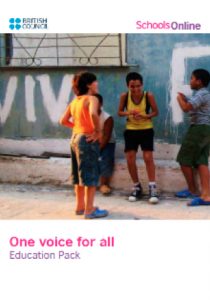 British Council School Online, 2013 This set of resources helps teachers work on the themes of Rights and Responsibilities and Fairness and Equality through an exploration of human rights and street children. Its aims to allow learners to develop understanding of the key concepts of global citizenship, universal rights and justice.
British Council School Online, 2013 This set of resources helps teachers work on the themes of Rights and Responsibilities and Fairness and Equality through an exploration of human rights and street children. Its aims to allow learners to develop understanding of the key concepts of global citizenship, universal rights and justice.
One Voice for All Education Pack
-
Rivers of the World Education Pack
 British Council This education resource provides cross-curricular activities for pupils aged 7–14. It is designed to help pupils develop core skills and encourage them to explore and reflect on local and global issues.
British Council This education resource provides cross-curricular activities for pupils aged 7–14. It is designed to help pupils develop core skills and encourage them to explore and reflect on local and global issues.
Rivers of the World Education Pack
http://www.riversoftheworld.org.
-
Measuring Global Citizenship Education. A Collection of Practices and Tools
 Brookings Institution, 2017 This toolkit presents a brief review on the importance of GCED and its various definitions. It contains 50 profiles of assessment efforts, describing practices and tools to measure GCED at the classroom, local, and national levels.
Brookings Institution, 2017 This toolkit presents a brief review on the importance of GCED and its various definitions. It contains 50 profiles of assessment efforts, describing practices and tools to measure GCED at the classroom, local, and national levels.
Measuring Global Citizenship Education. A Collection of Practices and Tools
-
A Whole School Approach
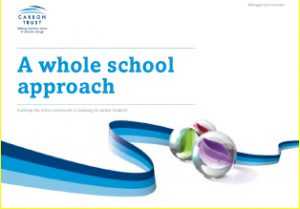 Carbon Trust, 2010 Using a whole school approach, this publication focuses on low-cost measures, motivating people to change and to become more energy efficient.
Carbon Trust, 2010 Using a whole school approach, this publication focuses on low-cost measures, motivating people to change and to become more energy efficient.
A Whole School Approach
-
Teaching Controversial Issues: Living with Controversy
-
 Council of Europe, 2014 This guide for teaching controversial issues contains a scoping paper and training activities that promote an open and collaborative approach, with a special emphasis on self-reflection and thoughtful, informed actions.
Council of Europe, 2014 This guide for teaching controversial issues contains a scoping paper and training activities that promote an open and collaborative approach, with a special emphasis on self-reflection and thoughtful, informed actions.
Teaching Controversial Issues: Living with Controversy
-
-
The Critical Thinking Workbook – Games and Activities for Developing Critical Thinking Skills
 Global Digital Citizen Foundation The workbook is filled with easy and fun activities.
Global Digital Citizen Foundation The workbook is filled with easy and fun activities.
The Critical Thinking Workbook – Games and Activities for Developing Critical Thinking Skills
-
Global Digital Citizenship, Quick Start Guide
 Global Digital Citizen Foundation This 15-page easy guide contains a questionnaire on Global Digital Citizenship as well as simple implementation plans for teachers in primary, middle and senior schools.
Global Digital Citizen Foundation This 15-page easy guide contains a questionnaire on Global Digital Citizenship as well as simple implementation plans for teachers in primary, middle and senior schools.
Global Digital Citizenship, Quick Start Guide
-
Project Based Learning Ideas Guide – K-12 Learners
 Global Digital Citizen Foundation There are 9 projects with choices for primary, middle, and senior grades. The ideas can be customized for all grade levels as cross-curricular studies.
Global Digital Citizen Foundation There are 9 projects with choices for primary, middle, and senior grades. The ideas can be customized for all grade levels as cross-curricular studies.
Project Based Learning Ideas Guide – K-12 Learners
-
Solution Fluency Quickstart Skills Guide
 Global Digital Citizen Foundation It describes 6Ds of solution fluency: define, discover, dream, design, deliver, debrief.
Global Digital Citizen Foundation It describes 6Ds of solution fluency: define, discover, dream, design, deliver, debrief.
Solution Fluency Quickstart Skills Guide
-
Global Citizenship Guides: Teaching Controversial Issues
 Oxfam, 2006 This guide explores what controversial issues are, why they should be taught, and includes classroom strategies, existing guidance and practical teaching activities.
Oxfam, 2006 This guide explores what controversial issues are, why they should be taught, and includes classroom strategies, existing guidance and practical teaching activities.
Global Citizenship Guides: Teaching Controversial Issues
-
Whole School Case Studies
 Oxfam, 2013
Oxfam, 2013
Whole School Case Studies
-
– Education for Global Citizenship – A Guide for Schools
– Global Citizenship in the Classroom – A Guide for Teachers
 Oxfam, 2015 Practical and reflective guides to support the development of global citizenship in all areas of curriculum and school life.
Oxfam, 2015 Practical and reflective guides to support the development of global citizenship in all areas of curriculum and school life.
Education for Global Citizenship
-
Background: Using photographs in the classroom
-
Math, English, Science and Global Citizenship
 Oxfam Simple and clear guides for teachers to integrate GCED in each subject.
Oxfam Simple and clear guides for teachers to integrate GCED in each subject.
Math, English, Science and Global Citizenship
-
Think: Power-Shift activity (Primary)
Think: Power-Shift activity (Secondary)
-
Textbooks for Sustainable Development: A Guide to Embedding
 UNESCO-MGIEP, 2017 This is a guidebook for textbook authors on how to reorient the curriculum content towards peace, sustainable development and global citizenship,
UNESCO-MGIEP, 2017 This is a guidebook for textbook authors on how to reorient the curriculum content towards peace, sustainable development and global citizenship,
Textbooks for Sustainable Development: A Guide to Embedding
-
Work that Matters – the Teacher’s Guide to Project-Based Learning
 Paul Hamlyn Foundation, 2012 A teacher ’s guide for designing and managing projects for students with a tangible, publicly exhibited product.
Paul Hamlyn Foundation, 2012 A teacher ’s guide for designing and managing projects for students with a tangible, publicly exhibited product.
Work that Matters – the Teacher’s Guide to Project-Based Learning
-
The Education We Want – An Advocacy Toolkit
The Education We Want – Workshop Facilitator Guide

 Plan International, 2014 It contains a wide range of workshop activities to understand, plan or conduct educational advocacy.
Plan International, 2014 It contains a wide range of workshop activities to understand, plan or conduct educational advocacy.
The Education We Want – An Advocacy Toolkit
The Education We Want – Workshop Facilitator Guide
-
All Together Now! A Whole School Approach to Anti-bullying Practice
 Save the Children, 2010 Experiences of five schools offer an overview of the strategies and initiatives taken to encourage a culture in which bullying behaviours are less likely to occur. The appendices contains links to literature and examples of the questionnaires used to enable participation and gather information.
Save the Children, 2010 Experiences of five schools offer an overview of the strategies and initiatives taken to encourage a culture in which bullying behaviours are less likely to occur. The appendices contains links to literature and examples of the questionnaires used to enable participation and gather information.
All Together Now! A Whole School Approach to Anti-bullying Practice
-
Bringing Data to Life – Statistical Approaches to Real Global Issues
 Think Global, 2015 A toolkit to support secondary Math and Geography teachers and students to engage with global issues. It includes session plans, powerpoints and worksheets.
Think Global, 2015 A toolkit to support secondary Math and Geography teachers and students to engage with global issues. It includes session plans, powerpoints and worksheets.
Bringing Data to Life – Statistical Approaches to Real Global Issues
-
Stopping Violence in Schools: A Guide for Teachers
 UNESCO, 2009 The guide examines various forms of violence in schools, and offers practical suggestions for teachers on how to prevent them.
UNESCO, 2009 The guide examines various forms of violence in schools, and offers practical suggestions for teachers on how to prevent them.
Stopping Violence in Schools: A Guide for Teachers
-
Incorporating Education for Sustainable Development into World Heritage Education – A Teacher’s Guide
 UNESCO. 2011 A reference for teachers to explore world heritage and sustainable development to engage students in critical thinking and problem-solving with interesting activities to bring the world into the classrooms and classrooms to communities.
UNESCO. 2011 A reference for teachers to explore world heritage and sustainable development to engage students in critical thinking and problem-solving with interesting activities to bring the world into the classrooms and classrooms to communities.
Incorporating Education for Sustainable Development into World Heritage Education – A Teacher’s Guide
-
Media and Information Literacy Curriculum for Teachers
 UNESCO, 2011 This resource provides a framework to construct programmes for teachers to be media and information literate.
UNESCO, 2011 This resource provides a framework to construct programmes for teachers to be media and information literate.
Media and Information Literacy Curriculum for Teachers
-
Climate Change in the Classroom
 UNESCO, 2013 A guide for secondary school teachers on climate change, human rights, disaster risk reduction, including a six-day teacher training course with a time plan, presentation slides, field trip preparation, facilitation guides and handouts.
UNESCO, 2013 A guide for secondary school teachers on climate change, human rights, disaster risk reduction, including a six-day teacher training course with a time plan, presentation slides, field trip preparation, facilitation guides and handouts.
Climate Change in the Classroom
-
Teaching Respect for All
 UNESCO, 2014 The publication contains guidelines, questions for self-reflection, ideas and examples of learning activities to integrate Teaching Respect for All into upper primary and lower secondary education.
UNESCO, 2014 The publication contains guidelines, questions for self-reflection, ideas and examples of learning activities to integrate Teaching Respect for All into upper primary and lower secondary education.
Teaching Respect for All
-
Global Citizenship Education – Topics and Learning Objectives
 UNESCO, 2015 A pedagogical guidance for educators, curriculum developers, trainers, policy makers and other education stakeholders to integrate GCED in their education systems.
UNESCO, 2015 A pedagogical guidance for educators, curriculum developers, trainers, policy makers and other education stakeholders to integrate GCED in their education systems.
Global Citizenship Education – Topics and Learning Objectives
-
A Teacher’s Guide on the Prevention of Violent Extremism
 UNESCO, 2016 Teachers in upper primary, lower secondary and upper secondary education will find practical advice on when and how to discuss the issue of violent extremism, helping them to create an inclusive and conducive classroom climate.
UNESCO, 2016 Teachers in upper primary, lower secondary and upper secondary education will find practical advice on when and how to discuss the issue of violent extremism, helping them to create an inclusive and conducive classroom climate.
A Teacher’s Guide on the Prevention of Violent Extremism
-
Connect with Respect: Preventing Gender-based Violence in Schools
 UNESCO, 2016 This tool contains a series of guidance notes for teachers and school leaders on concepts and issues related to prevention of school-related gender-based violence, as well as structured programmes for teachers to work with early secondary school students.
UNESCO, 2016 This tool contains a series of guidance notes for teachers and school leaders on concepts and issues related to prevention of school-related gender-based violence, as well as structured programmes for teachers to work with early secondary school students.
Connect with Respect: Preventing Gender-based Violence in Schools
-
Schools in Action, Global Citizens for Sustainable Development – A Guide for Students
 UNESCO, 2016 This guide introduces secondary school students to Global Citizenship Education and Education for Sustainable Development, providing them with ideas and activities to contribute proactively to a more peaceful and sustainable world.
UNESCO, 2016 This guide introduces secondary school students to Global Citizenship Education and Education for Sustainable Development, providing them with ideas and activities to contribute proactively to a more peaceful and sustainable world.
Schools in Action, Global Citizens for Sustainable Development – A Guide for Students
-
Schools in Action, Global Citizens for Sustainable Development
A Guide for Teachers
 UNESCO, 2016 This guide introduces Global Citizenship Education and Education for Sustainable Development to teachers, incorporating ideas and activities for secondary school teachers to help their students become global citizens and sustainable development actors.
UNESCO, 2016 This guide introduces Global Citizenship Education and Education for Sustainable Development to teachers, incorporating ideas and activities for secondary school teachers to help their students become global citizens and sustainable development actors.
Schools in Action, Global Citizens for Sustainable Development – A Guide for Teachers
-
Education for Sustainable Development Goals – Learning Objectives
 UNESCO, 2017 The publication identifies indicative learning objectives and suggests topics and learning activities for each SDG. It also contains implementation methods at different levels from course design to national strategies.
UNESCO, 2017 The publication identifies indicative learning objectives and suggests topics and learning activities for each SDG. It also contains implementation methods at different levels from course design to national strategies.
Education for Sustainable Development Goals – Learning Objectives
-
Child Rights Education Toolkit: Rooting Child Rights in Early Childhood Education, Primary and Secondary Schools

 UNICEF, 2014
UNICEF, 2014
Main toolkit
Appendices
-
Beyond Access: Toolkit for Integrating Gender-based Violent Prevention and Response into Education Projects
 USAID, 2015 This toolkit offers guiding principles, evidence-based approaches and resources to integrate gender-based violent prevention and response.
USAID, 2015 This toolkit offers guiding principles, evidence-based approaches and resources to integrate gender-based violent prevention and response.
Beyond Access: Toolkit for Integrating Gender-based Violent Prevention and Response into Education Projects
-
World’s Largest Lesson – Educators Guide Course
World’s Largest Lesson – Resource page
 World ’s Largest Lesson, 2017
World ’s Largest Lesson, 2017
World’s Largest Lesson – Educators Guide Course
World’s Largest Lesson – Resource page

 Oxfam
Oxfam  Oxfam
Oxfam 
